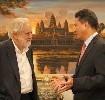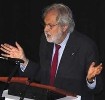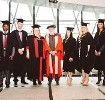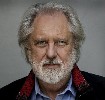Ireland could become one of the world’s great centres of education. But our schools and colleges are failing a generation, says David Puttnam – film-maker, ‘digital champion’, Labour peer and west Cork resident – who despairs of policymakers’ lack of vision.

The venue is within walking distance of his Cork-bound train. The bar is tourist bedlam and the only option is a sofa in the lobby. He hasn’t eaten all day, but they don’t serve food in the lobby. David Puttnam smiles the benign smile of a man who loves Ireland enough to want to live and die here but still doesn’t quite get it.
I whisper to a passing staff member that the soft-spoken man with the little black knapsack is a famous film-maker, that he’s 74 and has been working all day for Ireland, and could they find it in their hearts to bring him a slab of beef between a couple of slices of white bread, for pity’s sake. They turn out to be graciousness itself.
If pressed I could have added that he produced The Mission, The Killing Fields, Chariots of Fire, Midnight Express, Bugsy Malone and Local Hero. That his films have scooped 10 Oscars, 25 Baftas and a Palme d’Or. That he holds 45 honorary degrees from universities around the world. That he chose to take on the role of Ireland’s “digital champion” three years ago for no other reason than a fierce conviction that we Irish must do better by our young. And that progressive educationalists in Ireland think we’re very lucky to have him.
Digital champions, in officialese, are “ambassadors for the digital agenda”, appointed by EU states “to help every European become digital”. Puttnam was chosen by the Department of Communications, Energy and Natural Resources to provide “leadership” and “inspiration” in Ireland, and to “help achieve our national digital strategy”.
There is no mystery about how a tiring moviemaker became a relentless advocate for the democratisation of education. As the child of an dearly loved photojournalist father and ambitious, combative mother – “she was a shouter; some people had the Christian Brothers, I had my mum” – he won a prized place at grammar school.
“No one turned up at that grammar school wanting to be more successful” than he did, he says. But by the end of the first term it was over. Apart from the history teacher “there was no connection whatsoever. None. So they start telling me I’m useless. I’m written off.” He got 81 per cent in O-level history, thereby proving he wasn’t “completely stupid”. Yet, he says, “there was never even that conversation that maybe I was being badly taught.”
Creative bright sparks
He was rescued by the sense of possibility and opportunity pervading Britain in the late 1950s and early 1960s. Working as a messenger for an advertising agency, he enrolled in night school, designed his own curriculum and discovered a voracious appetite for learning. The agency fast-tracked him into a training programme, where he sat alongside the likes of Alan Parker, Ridley Scott and Charles Saatchi, a slew of creative bright sparks not cut in the system’s mould.
He still thinks of himself as a marketing man who makes movies. “I never ever thought of myself as an artist. I’m a facilitator. I’m good at getting people to work together, good at encouraging them to do better work than they imagine they might. But there’s not an artistic bone in my body.”
That engaging realism has combined with an enduring thirst for data and knowledge, a mastery of communication and a deadly serious intent to make him a formidable operator.
His entire film career involved dealing in celluloid, yet his advocacy for digital technology is total and immensely practical.
The impact of technology on education, he says, is akin to the impact of the machine gun on warfare. “We are living in a new world. The average is over. There was a time when you could have an average job and an average income and have a reasonably comfortable, average life. That’s over.”
Yes, it’s frightening. “Four out of five jobs for the young will absolutely rely on them having the full complement of digital skills. About 30 to 40 per cent of those jobs will be jobs we didn’t even know existed.”
We probably have until about 2025 before it all kicks off.
There will be no rescue then for children dumped by the system. This is what drives him. It’s why he visibly tenses when doubts are raised about the value of technology in schools. The day we meet, the doubters are getting media space because of a report based on students’ performance in the OECD’s controversial Programme for International Student Assessment, or Pisa, tests.
“It seems to be saying we were bypassing teachers,” he says. “Now I adore teachers. I spent six years of my life working hand in glove with them. I created the national [British] teacher awards. I also have this wonderful job chairing the Times Educational Supplement advisory board, and I get an enormous amount of data.”
And this much is clear, he says. “Technology becomes valuable when the people using it are well trained, well equipped, confident and imaginative. Technology is not especially valuable if it’s in the hands of people who don’t know what to do with it, who don’t necessarily believe in it, and who haven’t actually bothered to ask the children in their class what it means in their life.”
It’s a generational problem, he believes. To the overwhelming majority of young teachers “technology is just food and drink”. They’re the ones who sign up to what he calls the “teacher-led revolution” that is TES Connect, the Times Educational Supplement’s online social platform.
More than seven million education professionals from 197 countries, including about 55,000 from Ireland, have 1.4 million conversations a day with other teachers on the site, downloading teaching materials, posting ideas, looking for inspiration, connecting with students.
Irish subscribers have downloaded more than two million resources in the past year, he says – “and doing this in many cases almost unknown to their head teachers, who don’t have an interest in this kind of thing. They have no doubt whatsoever that they need to use this technology, but they don’t have a voice”.
A lot of the spokespersons, whether from unions or Government departments, are from Puttnam’s generation, he says. On the teaching side they have no wish to rethink their professional skills; on the policymaking side they’re looking for ways to avoid spending money. Obstructive forces are at work in both areas, he suggests.
“I’ve been in politics a long time now . . . and I know there are two ways of looking at policy development. One is to say this is our vision of how education should look in 2020-2025, because we actually believe if Ireland is going to be a seriously competitive nation we will have the skills to address that.
“The other way is to say we’ve been talking to the guys in the Department of Finance and they’re very worried about how we can save some money, and so we’ll lower our expectations, and our vision, down to what they say is affordable, so we won’t be embarrassed if we can’t deliver on the vision.”
This is not a case of good guys versus bad guys, he says. “But the problem is, approach number two destroys the opportunities possible for an entire generation of Irish men and women. I passionately believe that the right way is to look at what’s possible on behalf of the next generation of young people and then pull every single lever you can.”
Are we not doing that?
“No,” he says, “we are certainly not doing it to the degree to which it’s possible.”
Working with Pat Rabbitte, who made him digital champion, was wonderful, he says. “Ruairí Quinn was great. I feel he was trying to move the education needle aggressively, which is what it needed. They had a vision.” Ciarán Cannon, the Fine Gael TD and former minister for training and skills, is a “big loss to Government”, Puttnam says. “He understands the process and is very credible and really passionate in this area. In any well-run country, people like Ciarán should be used to the ultimate. I don’t feel what he has to offer has been given anything like enough credit.”
Attention from the top
Puttnam has a suggestion for the Taoiseach – “whom I happen to like very much”. He wants Enda Kenny “to call in Department of Education officials every week, for 15 minutes, and ask, ‘What’s happened this week?’ Because if you get attention from the top, things happen.”
The idea comes from Puttnam’s first job related to education, in 1997, when David Blunkett, the education secretary in the shiny new Tony Blair government, asked Puttnam to use his reputation as a film-maker to delve into school staffrooms, which had a serious morale problem.
“We got an awful lot done in the first 1½ terms, as Blair would insist on being updated once a week on what was happening in education. So there was real pressure – ‘What’s happened?’ ‘What has changed?’ ‘What is better this week?’ – and we managed to push through some extraordinary things. And that was against some relative frugality.”
But, then again, Ireland is not doing too badly. Okay, we may be “slipping a bit further behind the UK”, as Puttnam says, but he adds that we’re ahead of France and Germany and way ahead of southern Europe. So we’re not the worst, surely.
He suppresses a sigh. He deplores and fears this “all things considered we’re doing quite well” attitude.
Puttnam recalls working with Singapore while it was building itself into a powerhouse, when “all it had was people . . . and that quality of commitment, vision, leadership, and huge emphasis on education.”
Nobody wasted time being nice at meetings, he says. “It was, ‘Please identify what we’re doing wrong or could do better, what could be great and what could be excellent.’ That was the whole emphasis of every conversation. I’m not convinced those conversations are taking place here.
“I sincerely believe there is a fantastic opportunity for this country, partly because other countries dropped the ball. Equally I know there are other countries that are extremely ambitious, who have more vision, who feel they have more to lose and are prepared to take more chances.”
Vietnam is an example. “Did you know there are now more middle-class people in Asia than in the US and Europe combined? And those middle-class parents are spending up to 30 per cent of their combined incomes on their children’s education. Why? No pensions. The child is the pension.
“In the West we’ve got a fallback. Something like 50-60 per cent of all the world’s social security is spent in Europe. That’s our way of doing it. I’m not against social security – I’m a Labour peer – but it’s how you utilise the social-security blanket as underpinning. The net result is that you lose ambition, lose focus, lose vision, lose the ability to imagine what your future might be. Then, yeah, you’ve got a problem.”
Puttnam never raises his voice, but his tone intensifies as he continues. “I love this country, and I will, please God, die here. But the argument is this: are we in this country engaged in managing decline or is there genuine vision and aspiration for all the people in this country? If there is, the only starting place is education, and the only way you can drive it through is education.
“I want to make sure that all the right questions are being asked about the vision for education. Not the practicalities of it, not the affordability of it, but what is the vision of it – and then how do you go about delivering that vision?”
He notes that, in “the years of plenty”, education expenditure as a percentage of GDP went down, not up. “When someone could have had the vision, when we wanted to be the best-educated workforce in the world, this country got a lot of useless buildings, bankers ripping you off, and a kind of cultural catastrophe.”
What is Ireland doing wrong?
He has other questions about Irish vision and focus. “Ireland has got this fantastic opportunity, largely made possible by British visa restrictions, to become one of the world’s great centres of education. What I can’t get anyone to explain to me is why New Zealand, which is almost exactly the same size as Ireland in terms of population, has something like four times as many foreign students as Ireland. What is New Zealand doing right that Ireland is doing wrong? Answer: imagination and conviction.”
Does he want to continue as Ireland’s digital champion?
“I don’t want to have failed in this job. They are very generous with me. They do make me feel valued. I don’t expect to get a red card, but I can’t go on forever. I’m 74 and by far the oldest digital champion in Europe, by about 30 years, and I want to make sure that by the time I’m gone something tangible really has been put in there.”
If that sounds like a long goodbye, think again. The man who stood down from film-making at 55, burnt out and disenchanted with Hollywood values, is in movie mode again, pulled back by a fierce sense of urgency about his other great urgent passion: climate change.
Sceptics of climate change, he says, bear a “terrifying similarity” to those on the education side. “I either spend the next three or four years of my life wittering on in the House of Lords on the subject or find another way of getting the message across.”
The film is based on the book Don’t Trust, Don’t Fear, Don’t Beg, an account of the Arctic 30, the Greenpeace activists who spent more than three months in a Russian detention centre just before the Winter Olympics in Sochi, after being arrested for “piracy” when they tried to board a Russian oil rig. Already he’s working with Emma Thompson; Marion Cotillard and Emma Stone – “people I’d chop my left arm off to work with” – are also on his wish list, he says as we walk smartly towards the Cork train, towards home and Skibbereen. “I think we’ve never had a better group of actors.”
Read the original article on The Irish Times
 Follow David Puttnam on Twitter
Follow David Puttnam on Twitter 


















